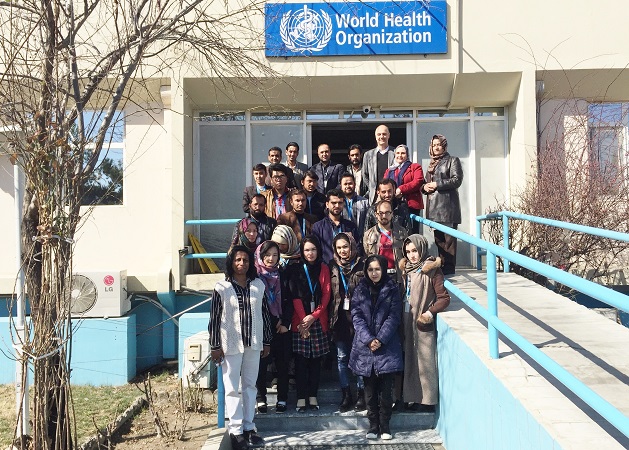 WHO Afghanistan staff. Photo WHO AfghanistanKabul 13 March 2018 – WHO Afghanistan supports a survey to assess risk factors associated with noncommunicable diseases (NCDs) in the country. The survey will be conducted from March to May 2018.
WHO Afghanistan staff. Photo WHO AfghanistanKabul 13 March 2018 – WHO Afghanistan supports a survey to assess risk factors associated with noncommunicable diseases (NCDs) in the country. The survey will be conducted from March to May 2018.
The STEP survey is conducted with the support of the WHO Regional Office for the Eastern Mediterranean and WHO country office, in coordination with Ministry of Public Health, Afghanistan. Data will be collected on behavioural aspects, as well as physical and biochemical measurements from a nationally representative sample.
NCDs are a major cause of mortality and morbidity in Afghanistan and estimated to account for 37% of total deaths.
 WHO Afghanistan staff. Photo WHO AfghanistanKabul 13 March 2018 – WHO Afghanistan supports a survey to assess risk factors associated with noncommunicable diseases (NCDs) in the country. The survey will be conducted from March to May 2018.
WHO Afghanistan staff. Photo WHO AfghanistanKabul 13 March 2018 – WHO Afghanistan supports a survey to assess risk factors associated with noncommunicable diseases (NCDs) in the country. The survey will be conducted from March to May 2018.
The STEP survey is conducted with the support of the WHO Regional Office for the Eastern Mediterranean and WHO country office, in coordination with Ministry of Public Health, Afghanistan. Data will be collected on behavioural aspects, as well as physical and biochemical measurements from a nationally representative sample.
NCDs are a major cause of mortality and morbidity in Afghanistan and estimated to account for 37% of total deaths.
“The burden of NCDs on public health has not yet been documented or acknowledged enough in Afghanistan. The current health service delivery package in the country does not actually include management of NCDs, so we need to raise awareness and support the recognition of NCDs as a public health problem through additional advocacy," stated WHO Afghanistan Programme Manager Dr Supriya Warusavithana. Dr Warusavithana added, that “The key to controlling NCDs is prevention, and to promote prevention, we need to identify the most common risk factors behind them.”
The survey results will be of importance, as they provide evidence for the design and implementation of effective interventions for the prevention and control of NCDs. The data generated from the survey are expected to be useful to inform future health policy.
The STEPS instrument, created by WHO in 2014 to assess NCD risk factors, was adapted to suit the Afghan context and to capture the differences of in the behavior among different ethnic groups in the country.
The first data collectors were trained in Kabul with technical support provided by the WHO Regional Office in February, 2018.
For more information, contact:
Dr Supriya Warusavithana
Programme Manager
Phone: 0782 200 350
email:









